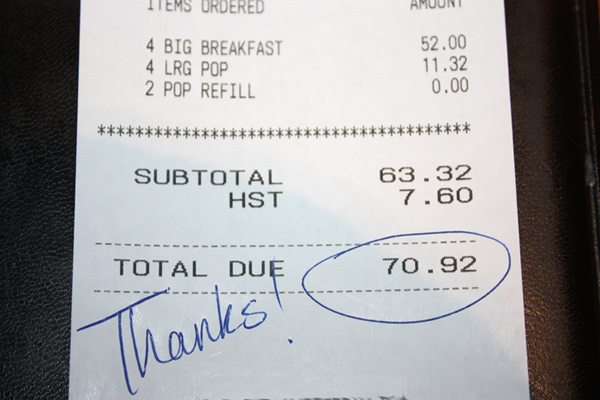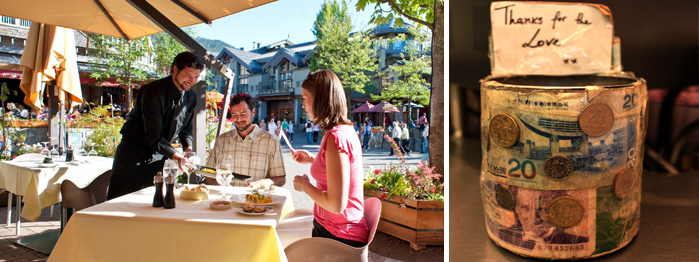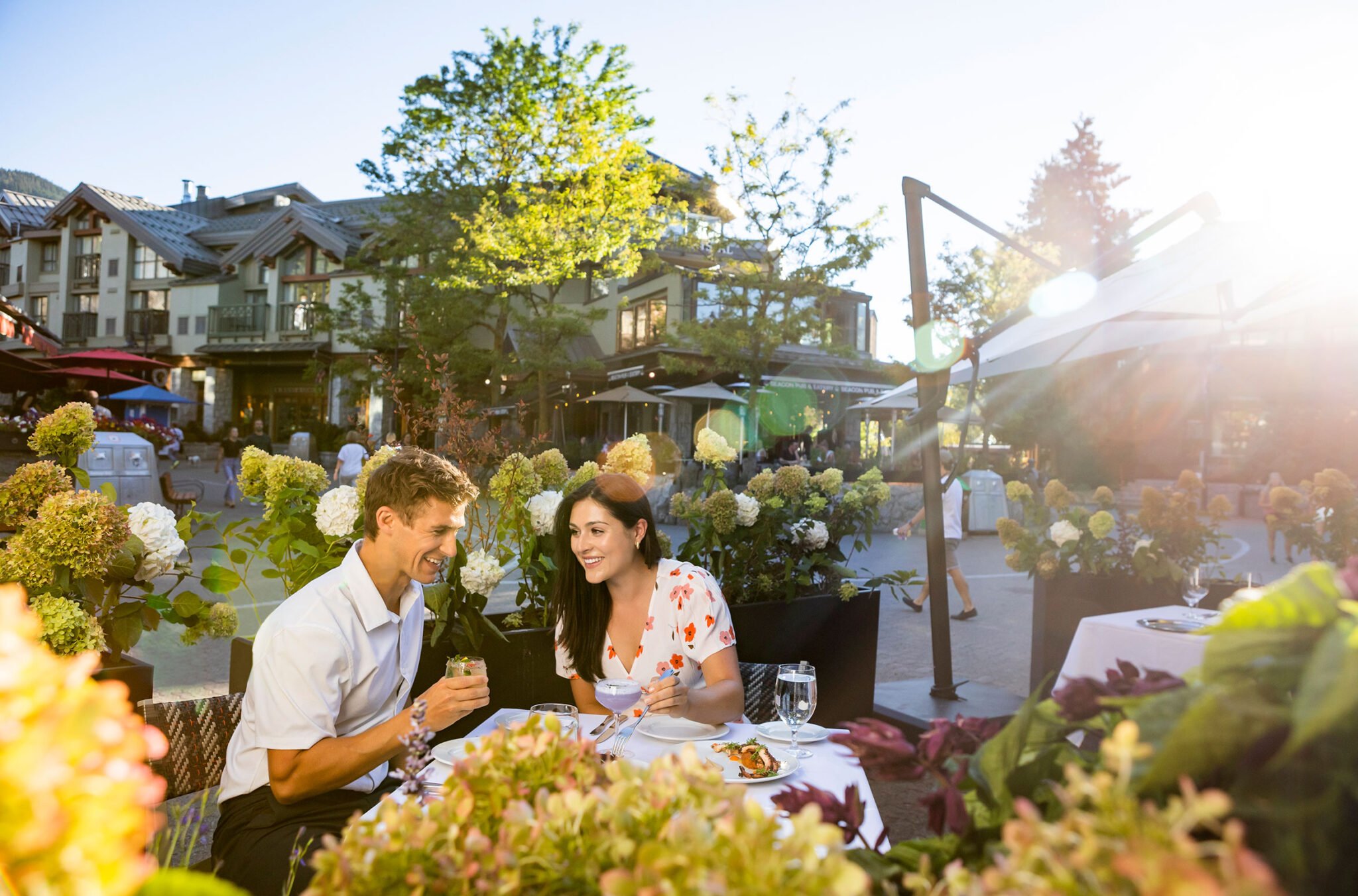Editor’s note: This guide to tipping in Whistler was last updated in March 2024.
Dear guests and visitors from afar,
I get it. How are you expected to follow local customs if no one bothers to tell you what they are? Figuring out who you are expected to leave a gratuity for in Whistler, and how much it ought to be, can be as confusing as trying to find a right angle on a map of Whistler Village.
To make your life easier, and your vacation less stressful, the team here at The Insider hit the streets and came back with a semi-definitive guide for tipping in Whistler.

Of course, in most circumstances, the official line is always, “Gratuities are graciously accepted but never expected.” We certainly aim to please up here and everyone really ought to be doing their best to make your stay enjoyable, gratuity or not.
It’s good to know that most goods and services in British Columbia are subject to a sales tax totalling 12% of the purchase price (7% PST plus 5% GST) and tipping calculations are suggested on the pre-tax amounts.
Having said that, tipping is a local custom so here we go…
Restaurants/Bars/Pubs
This is the exception to the rule above. Tipping is expected anywhere someone carries food or drinks to your table or serves you an alcoholic drink over a bar or counter. Although you might find some fast food establishments and liquor stores do have tipping as an option on their keypad, and maybe they feel like they give incredible service, but that’s up to you.
Certainly, your servers should always be courteous and attentive but the reason tipping is expected is because each server/bartender actually has to pay to serve you.
Establishments implement a “Tip Out”, usually 4 to 8 % of sales, that each server has to pay out of the cash they take in. The Tip Out gets divided up amongst the bussers, bar staff, doormen, kitchen workers, dishwashers, hostesses and chefs – basically everyone who works in the establishment. So if your dinner bill is $100, the server tips out anywhere from $4-8 regardless of whether you leave a tip or not. (This is why many establishments include a gratuity for larger parties.)
Why does it operate this way? I don’t know, it just does, but bear in mind that most servers/bartenders make minimum wage and only work when it’s busy so they literally depend on their tips to live.
The standard for restaurants/bars/pubs is to tip 15 to 25 % (remember, after Tip Out the server walks with 5-8% less than that.) Feel free to leave more for exceptional service and remember that going lower than 5% often means someone is paying to serve you. If you feel insulted or ignored it is far more useful for everyone involved to speak to management rather than simply leaving nothing and thinking “That’ll show them.” Servers know they depend on your tips, however, so it’s in their best interest to give you pleasant service and put forth the extra effort (of course everyone has a bad day sometimes…)
Breakfast servers often work harder and the meal price is lower so feel free to toss them an extra couple of bucks if they kept your coffee full. Working breakfasts is pretty rough on server morale because it often means they’re missing fresh powder on the ski hill or solid beach/bike time.
Most importantly, if you do have a problem with a server or service level, make sure to talk to a manager on the way out and explain your grievances. They can’t fix the problem if we don’t know what it is.

Cafes, Coffee Shops and Food Stands
Strangely, gratuity is not expected or customary for food or non-alcoholic drinks that someone hands you over a counter. Basically, if you order it and pay right away, tipping is entirely optional.
Most places will have a small jar on the counter and it never hurts to toss in some change or add a buck onto your debit or credit card.
A good indicator of when to tip is whether or not the debit/credit card terminal has a tip option. Many counter-service places have the option but don’t feel obligated to tip the same as a full-service restaurant. 10 to 15 % is plenty and leaving nothing is still very common.
Retail/Rental Shops
In Whistler, we don’t tip on retail purchases, regardless of how helpful (or unhelpful) the salesperson was. Perhaps it’s because a retail wage is higher than a service industry wage, or maybe because some salespeople make commission but regardless, most people don’t tip on retail purchases or things like bike or ski rentals.
Taxis
The average tip for taxis is 15% of the total fare. Many people go higher as the fares in Whistler are often not that large and it’s easier to just be extra generous than sit and wait for the driver to dig up $1.35 in change. Many Whistler locals will tip extra if the cabbie has good music playing or offers up an awesome story of cab-driving adventures.
Limos/ Shuttles
Chartered limos generally get a 15-20% tip depending on how much fun you had. Hotel shuttles that repeatedly drive you around town are usually worth $5-10 at the end of the stay.
Hotels – Valet
While no decent hotel valet would ever push you for it, the standard tip is $5 after they unload the bags and another $5 when you return to pick up your vehicle. Many people tip more but a fiver is considered the average. If you are doing multiple trips in and out of the hotel each day, $2 per car retrieval is fine.
Hotels – Bellman
The kid who lugs your suitcases/skis/boots/wardrobe up to the hotel room generally receives a couple of bucks per bag up to $10 to $20 in the finer accommodation establishments. Again, they’ll never complain if they get less but $10 to $20 is standard, perhaps depending on how many bags you’re travelling with and how heavy they are.
Hotel – In-Room Dining
Room service usually has a gratuity already included, so check the bill or ask, but if not treat the attendant the same as a regular waiter and offer 15%.
Hotels – Housekeeping
The average tip for housekeeping is $2 to 5 per night stayed, depending on how many nights and how messy your kids are.
Tour Guides / Instructors
The consensus around town is that a guide/instructor who gives great service will always be happy to receive a cash $10 to $20 tip (or 10 to 20% of the tour cost). Some people don’t tip on tours but considering the amount of time you spend with this one person, or that your safety and well-being may be in their hands, it makes sense to offer gratitude for a job well done.
Ski School / Ski Lessons
The Whistler Blackcomb Snow School offers a huge range of lessons, and regardless of whether you do a half-day or multi-day camp a 10 to 20 % tip on a ski lesson is the generally accepted rate. Note that if you have a ski or snowboard instructor over several days or you have the kids in an adventure camp you might want to tip at the end of the week.
Salons
This one has a bit of grey area. Hairdressers/estheticians and masseuses generally get a 15- to 20% gratuity depending on how happy you are (some hairdressers report getting up to 30% because admit it, your haircut is fairly important.) You don’t need to tip your dentist, doctor, or the person who does your laser hair removal or Botox. Although my buddy tipped his surgeon once, $10 in a handshake, he’s quite the comedian.
Yoga
Don’t tip on group yoga sessions and while most yoga teachers I talked to said they don’t get tipped on privates some reported that it does happen. This one is up to you.
Babysitters/Nannies
Taking care of your children is perhaps the most important job of all and the local tradition is to tip a babysitter 15-20 %, especially if they are dealing with multiple kids. If your kids seem happy and healthy a tip is the norm…
And that is that. We may have forgotten a few things but overall, the above list covers most of the local customs around tipping and gratuity. The easiest way to remember it all is other than restaurants and bars, few people will give you a hard time for not tipping but when in doubt tip 15% (before tax). Perhaps unsurprisingly, it has been reported that people who throw big money around town will sometimes find the word has gotten out and they receive perks and/or “locals treatment.” Such is the way of the world, I suppose.
Hopefully, this helps shed some light on our crazy Canadian customs.
The best part is you don’t have to tip nature, and the scenery is free. Have fun.


